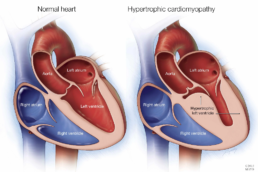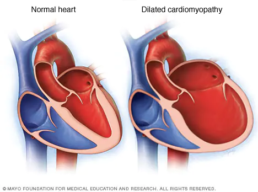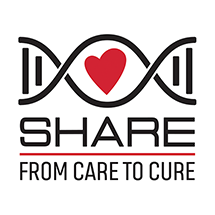Hypertrophic Cardiomyopathyand Dilated CardiomyopathyFacts
Hypertrophic Cardiomyopathy (HCM) Facts
Hypertrophic Cardiomyopathy (HCM) is the number one inherited cardiovascular disease. It is estimated to affect as many as 1 in 500 people and is the leading cause of sudden cardiac death in young adults. The condition is characterized by an abnormal thickening of the heart muscle, especially the left ventricle (the main pumping chamber).
HCM can also cause the heart muscle to become stiff, thereby making it difficult for the heart to relax and refill with fresh blood between beats. This results in the heart needing more pressure than normal to fill, which can cause shortness of breath.
Normal heart vs. Hypertrophic Cardiomyopathy

Some people with HCM also suffer from obstruction to the outward flow of the blood from the heart, which may be associated with dizziness, fainting (syncope), or chest pain. The abnormally thick heart muscle may produce turbulent blood flow, which may be heard as a murmur with a stethoscope. In some patients this can lead to the initial diagnosis of HCM.
Longstanding high blood pressure, certain diseases of the heart valves, and even elite athletic training can cause the heart muscle to thicken. With HCM, however, the thickening occurs in the absence of an identifiable cause.
In patients with HCM, the heart muscle cells and fibrous tissue increase in size, leading to an overall thickening of the muscle. HCM is also characterized by what is known as myocardial disarray or the abnormal alignment of muscle cells.
This image depicts the thin and thick cardiac muscle filaments and the relative location of the different proteins involved in muscle contraction. The filaments lie parallel to each other and slide along one another to form a muscle contraction. In hypertrophic cardiomyopathy, mutations may impair these and other protein interactions, result in ineffectual contraction of the sarcomere, and produce hypertrophy and disarray of myocytes.
For more information on HCM, feel free to download this pdf from Brigham and Women’s Hospital Hypertrophic Cardiomyopathy Clinic.
Dilated cardiomyopathy (DCM) Facts
Dilated Cardiomyopathy (DCM) is an inherited cardiovascular disease which predominately affects the muscle cells of the left ventricle (the main pumping chamber) of the heart. The left ventricle becomes dilated or enlarged, and contracts less vigorously, which renders it less efficient in pumping blood to the rest of the body.

Many people with DCM may be symptom free early in the course of their disease, but for some the disease is rapidly progressive and life threatening.
The inability of the heart to supply the body’s organs and tissue with enough blood flow (and thus oxygen and nutrients), known as heart failure, is common among DCM patients. DCM is also known to be associated with abnormal blood clots, heart rhythm problems (irregular heartbeats) and sudden cardiac death.
Headquarter
Contact
Aaron Murphy
Edelman
Aaron.murphy@edelman.com
1 (415) 229-3331
